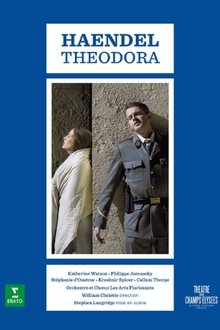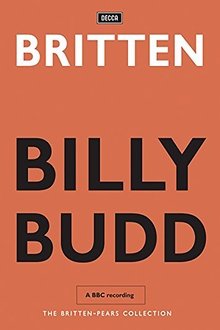Extraordinary soprano Lise Davidsen stars as the volatile diva Floria Tosca for the first time at the Met. David McVicar’s thrilling production also features tenor Freddie De Tommaso in his eagerly anticipated company debut as Tosca’s revolutionary lover, Cavaradossi, and powerhouse baritone Quinn Kelsey as the sadistic chief of police Scarpia. Met Music Director Yannick Nézet-Séguin conducts the electrifying score, which features some of Puccini’s most memorable melodies. This live cinema transmission is part of the Met’s award-winning Live in HD series, bringing opera to movie theaters across the globe.
Related Movies

The Phantom of the Opera (1925)
The deformed Phantom who haunts the Paris Opera House causes murder and mayhem in an attempt to make the woman he loves a star.

Amadeus (1984)
Disciplined Italian composer Antonio Salieri becomes consumed by jealousy and resentment towards the hedonistic and remarkably talented young Salzburger composer Wolfgang Amadeus Mozart.

Puccini: Turandot (2009)
Franco Zeffirelli's magnificient staging of Puccini's final opera - a fairy tale set in a mythical China - is one of the most popular in the Met repertory. In this Live in HD production, Maria Guleghina takes on the title role and Marcello Giordani is Calaf, the unknown prince. Marina Poplavskaya and Samuel Ramey co-star, and Andris Nelsons conducts in his Met debut.
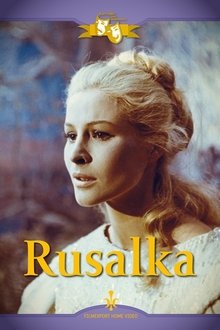
Rusalka (1963)
The water fairy Rusalka falls in love with an earthly prince. In vain, Father Aquarius warns her. Her sincere feelings are met with human treachery...

A Cossack Beyond the Danube (1953)
A Ukrainian comic opera with spoken dialogue in three acts with music and libretto by the composer Semen Hulak-Artemovsky (1813–1873). The orchestration has subsequently been rewritten by composers such as Reinhold Glière and Heorhiy Maiboroda. This is one of the best-known Ukrainian comic operas depicting national themes.
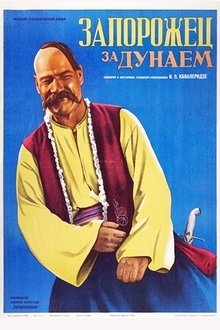
Cossacks Beyond the Danube (1937)
Adapted from the opera written by the composer Semen Hulak-Artemovsky.
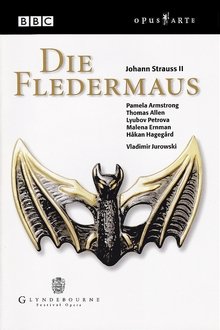
Strauss II: Die Fledermaus (2003)
Glyndebourne's pulsating new production of the Waltz King's much-loved comic operetta. Its story centers on a magnificent masked ball, given by a Russian prince, that brings together all the main characters in various disguises. The three-act journey from boudoir to ballroom to jail provides ample opportunities for farce and humor, but also for genuine human emotion and a surprisingly realistic view of urban life.
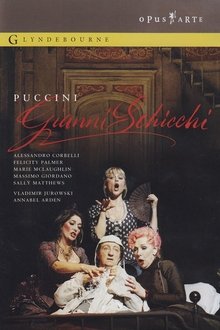
Puccini: Gianni Schicchi (2004)
Opera in one act, libretto by G. Forzano based on Dante's Divine Comedy. Third part of his opera Triptych. The plot is based on canto XXX of "Inferno" from "The Divine Comedy", which are dedicated to the rogue and deceiver Gianni Schicchi, who was punished for his sins: he impersonated a dying rich man in order to make a forged will on his behalf. Gianni Schicchi is Puccini's only comic opera, a brilliant example of a modern opera buffa based on the tradition of Verdi's Falstaff. The most expressive recitative, bubbling melody, sharp character, impetuous tempo distinguish her music. Recorded live at Glyndebourne Opera House, Sussex, UK on 11 July 2004.

Intimate Apparel (2022)
Experience the story of seamstress Esther who begins writing to a mysterious suitor laboring on the Panama Canal. Featuring a libretto by Pulitzer Prize winner Lynn Nottage, this powerful opera is directed by Tony winner Bartlett Sher.
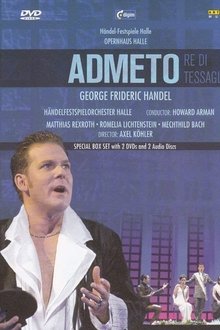
Handel: Admeto (2006)
Axel Kohler, the internationally renowned countertenor has brought Admeto into the modern era in timeless style by the skillful application of imaginative theatrical digressions. Köhler's production at the Halle Opernhaus revisits a work that encompasses comedy, tragedy and almost absurd grotesqueness, couching it in the convincing metaphor of a modern hospital.
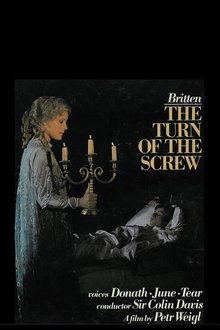
The Turn of the Screw (1982)
Benjamin Britten’s opera of the Henry James novel. An inexperienced governess is sent to a country house to care for two children, whom she is gradually convinced have been corrupted by the ghosts of a previous manservant and governess…
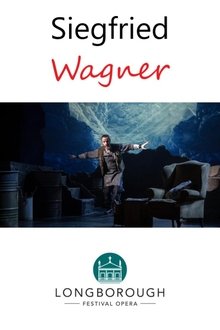
Siegfried (Longborough Opera Festival 2022) (2022)
The hero Siegfried reforges his father’s shattered sword, embarking on a quest for the greatest prize of all – the love of the valkyrie Brünnhilde, who lies trapped in a ring of fire. Siegfried is the third opera in Richard Wagner’s four-opera cycle Der Ring des Nibelungen. Wagner broke off composition at the end of Act II of Siegfried to write Tristan und Isolde and Die Meistersinger von Nürnberg, returning to Siegfried seven years later. Longborough Festival Opera, known as the British Bayreuth, calls on renowned Wagnerian Anthony Negus to conduct and Amy Lane to stage this new production of Siegfried in the bucolic English Cotswolds.
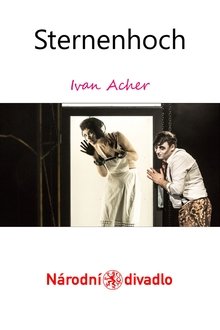
Sternenhoch (2019)
Trapped in an abusive marriage, a wealthy German prince desperately seeks a way out. But what appears to be the road to salvation soon turns into a highway to hell. The universal language of music meets the international language of Esperanto in this debut opera by Ivan Acher. The carpenter, forest worker, designer and composer has cleverly blended electro-acoustic and contemporary music to breathe life into Ladislav Klíma’s expressionist novel, The Sufferings of Prince Sternenhoch.

Tosca (1941)
Non-musical account of Puccini's opera: Tosca and Cavaradossi are in love, but the tyrant Scarpia desires Tosca and oppresses Cavaradossi who is fighting for freedom.
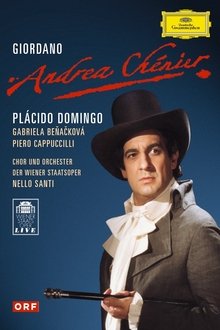
Andrea Chenier (1981)
Although Domingo was younger and Banackova looked more like the sweet and innocent young Madalena than the one played by Tomowa-Sintow in the ROH production, this production was not as good. It was not as tight and neat. The tempo set was far too slow for the time-period of the story. The stage setting was distracting. The lighting was too dark. Except Domingo, a natural actor who was always into his role and sings and acts with passion, none of the other performers came up with a convincing portrayal of the role he/she played.
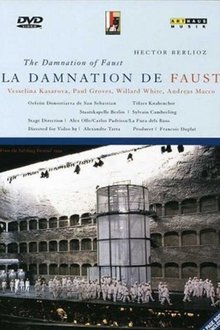
Berlioz La Damnation de Faust (1999)
While excerpts of the score are popular today, like the Hungarian March in the first part or Marguerite's romanza "D'amour l'ardente flamme" in the fourth part, the complete "légende dramatique," as the composer called it, is rarely performed. But you must remind of this opera for its unity, its dramaturgy, its libretto (written by Gérard de Nerval) and its long lyrical flights of poetry. Alex Ollé and Carlos Padrissa (La Fura dels Baus) well understood it, when they staged this blazing and infernal version of Berlioz’s score. The musical direction by Sylvain Cambreling, but also the performance by Vesselina Kasarova (Marguerite), Paul Groves (Faust), Williard White (Méphistophélès) and Andreas Macco (Brander), joined by the Staatskapelle Berlin Orchestra, the Chorus Orfeón Donostiarra from San Sebastián and the Tölzer Knabenchor made this production at the Salzburg Festival a reference version of Berlioz’s score.
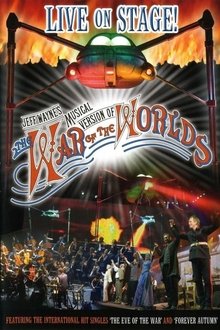
Jeff Wayne's Musical Version of The War of the Worlds: Live (2006)
The live version of Jeff Wayne's 1978 bestselling album was brought to the stage in 2006 as part of a sell-out tour of the UK. Filmed at London's Wembley Arena, and using a blend of theatre, music and visual imagery, the production incorporates performers from the original recording, including Justin Hayward, Chris Thompson and Wayne himself. There's also audio and visual elements featuring Richard Burton, as well as the ten-piece Black Smoke Band and the 48-piece Ulladubulla Strings.

